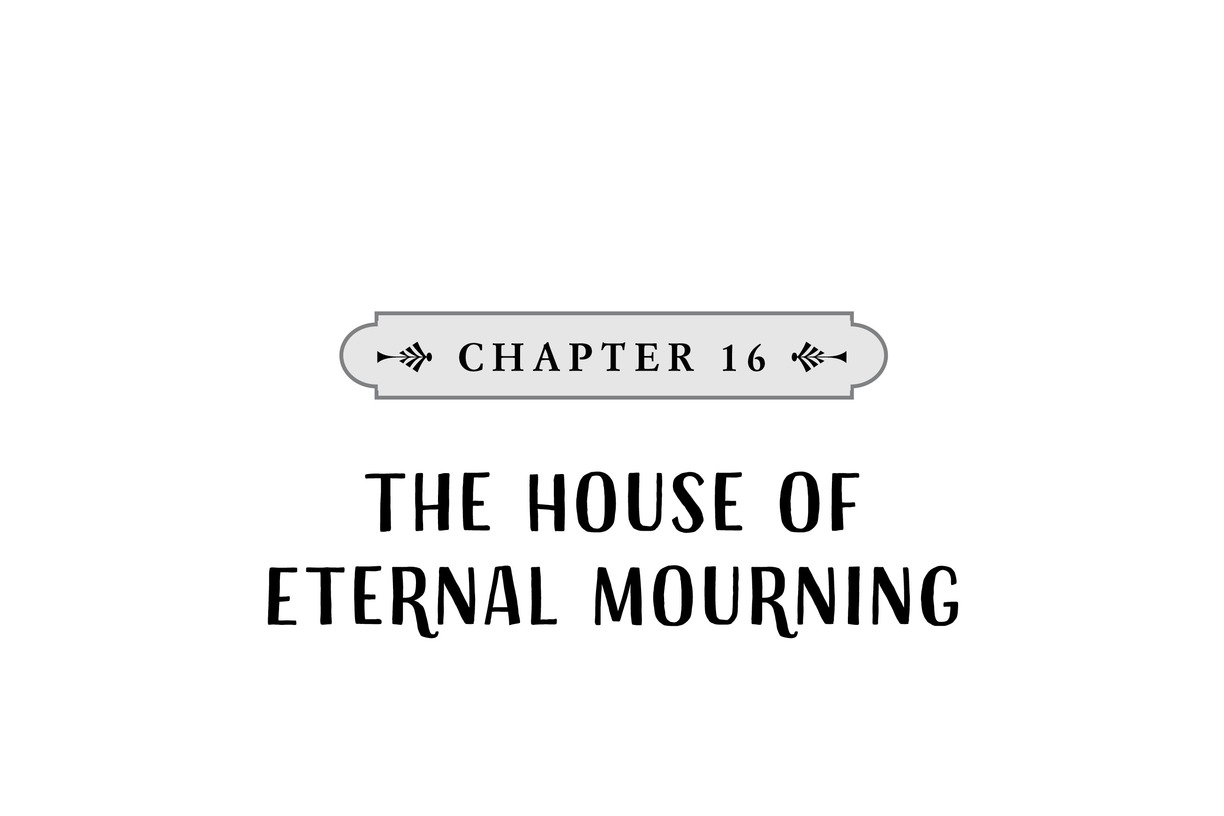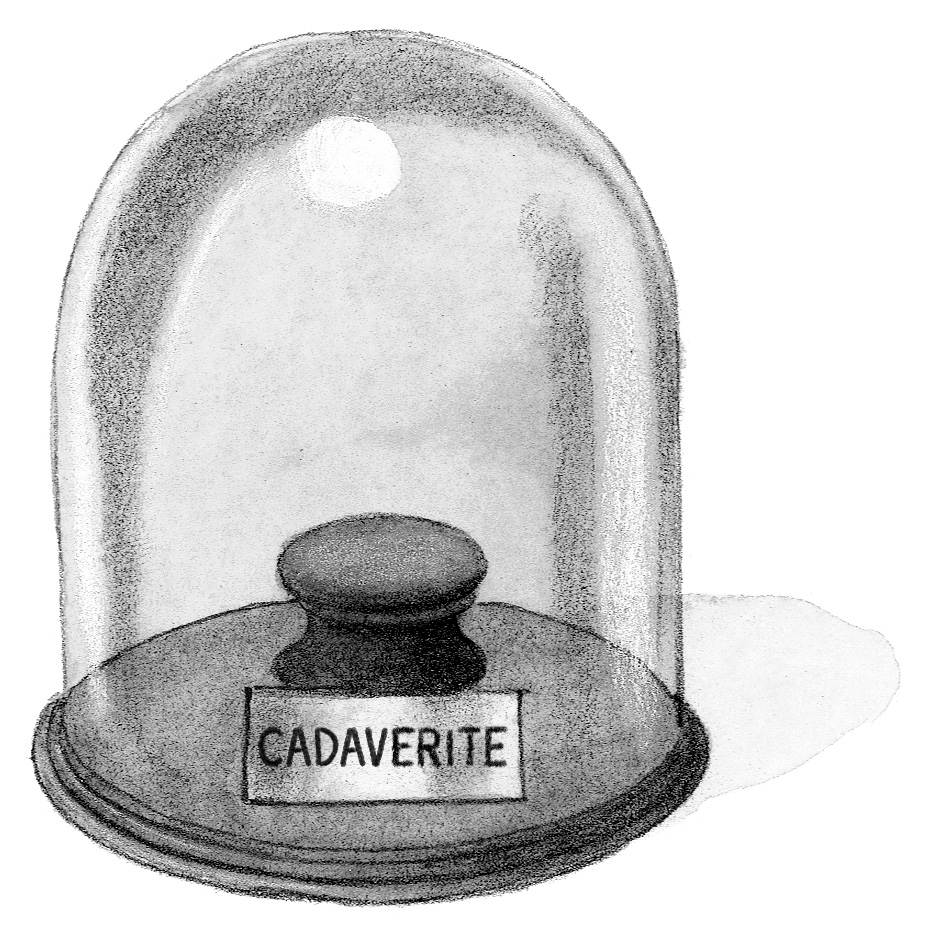
The Chamber of Jewels had clearly been designed as a library, with walls of rich mahogany shelving that scrambled from floor to ceiling. And indeed, a small collection of ancient, leather-bound books still inhabited some lower areas.
But most of the available shelf space had been given over to the display of gemstones. Each was protected by a glass dome and sat upon a round wooden plinth with a small metal plaque to identify the contents. Museum lights recessed into the underside of the shelves illuminated the specimens beneath and cast the room in a ghostly glow.
As he appeared so far to be alone, August browsed the collection. Some of the gems were as you might expect: gloriously hued, and cut with many glittering facets. Others were smoothly surfaced and opaque. Still others looked like any rough, commonplace rock you might kick down the street or throw down a well.
A few of their names were familiar: amethyst, fire opal, yellow sapphire. Others had more exotic, intriguing titles: meteorite, bloodstone, zebra rock.
One specimen in particular caught August’s attention. It bore the name tag “Cadaverite.” But it was not the stone that arrested him; rather, it was the stone’s absence. Despite the labeling, the display was empty.
August found something inexplicably tragic about this vacant dome and the undeniable fact that something was very much missing.
He was contemplating possible explanations when, from the corner of his eye, he noticed a slight movement. August turned to observe a palmetto fan wafting gently back and forth. It was held by long, slim fingers—fingers that belonged to a person seated in, and concealed by, one of the high-backed chairs angled toward the fireplace.
August was not, and had never been, alone.
Softly rustling, the figure rose from that shadowy part of the room. It was a woman, extravagantly dressed in a lengthy, black silk gown. An elaborate, high black comb protruded from the back of her predictably honey-blond hair. Her entire personage, from comb to ankles, was draped in a veil that glittered with tiny black seed pearls.
Behind the black lace lay twinkling black eyes, a fine nose, and enigmatic, rose-colored lips. August would not have been surprised if the woman had introduced herself as queen of the underworld.
But she didn’t.
Instead, she tilted her head and examined the boy with curiosity.
“There was gossip, of course,” she said in a voice as warm and creamy as café au lait, “surrounding the ghost of Locust Hole. But then, ghost stories are not uncommon around these parts and rarely credible.”
August could see some resemblance to Hydrangea. The women shared a similar height and frame and must logically have been close in age. But where Hydrangea seemed limp, fragile, and exhausted, the air around this woman buzzed with some vital, magnetic energy.
“It was only,” she continued, “after Beauregard returned with his report—you met your cousins, yes?—that I deduced this so-called phantom could only be Lily’s child. It was rumored that my youngest sister had given birth, but all assumed that the baby was taken—along with its mother—by the epidemic.”
With a soft expression, the woman reached out and absently touched August’s cheek.
“You’re like her,” she said. “At least, from what I recall. She was just a girl the last time I saw her. Before I…left.”
“I don’t remember her,” said August, speaking more loudly in order to be heard the first time.
“It was so long ago,” agreed the woman. “And yet also like yesterday. The Peruvian flu was a democratic disease, I will give it that, claiming the lives of rich and poor alike. Men. Women. Children too.”

She looked away, toward the shuttered window, the fan rippling her veil.
“It took my husband, you know,” she said. “It crushed my heart. It emptied the world of happiness, of music, of color.”
She glanced briefly around and gestured at their surroundings.
“And so we wear black. And close the shutters. We cover the mirrors.” Her chest rose as she sighed deeply. “Ours, child, is a house of eternal mourning.”
“You must have loved him very much,” said August.
The woman’s gaze was fixed on something in the past, in sadness. Her black eyes burned with something fierce and awful.
“I was robbed,” she said in a voice raw with grief and fury that sent a shiver down the boy’s spine. “I would do anything to recover what I lost.”
For a moment, the room was horribly silent. And then, as if suddenly returning to the present, the woman started slightly and, facing August, smiled. She extended her fingers in a regal manner that suggested they should be kissed. Navigating the huge black diamond rings, August did so.
“I,” quietly announced the woman, “am your aunt Orchid.”
“I brought you a gift,” blurted August, presenting his now rather crumpled parcel.
Orchid Malveau laid her fan and August’s box on a table topped with black marble and delicately unwrapped the gift. From the tissue, she withdrew a model. It depicted a skeleton boy being carried aloft by a large orange balloon.
August was suddenly painfully aware of the opulence surrounding them. His model instantly seemed out of place and foolish. Ridiculous, even.
“I made it myself,” he muttered.
“How…enchanting.” Orchid’s smile seemed forced. She moved to the mantel and pushed aside a lush potted fern, replacing it with the skeleton boy. “I shall treasure it forever.”
Orchid’s genteel politeness somehow made August feel even worse. He nodded, deeply embarrassed.
Orchid seemed sympathetic to his plight.
“I’ll have Escargot bring us tea,” she said gently, twisting a brass S-shaped handle affixed to the wall. On its release, August heard the muffled sound of a bell somewhere deep within the bowels of the mansion.
“In the meantime, child, come sit here. I have a proposal for you!”
